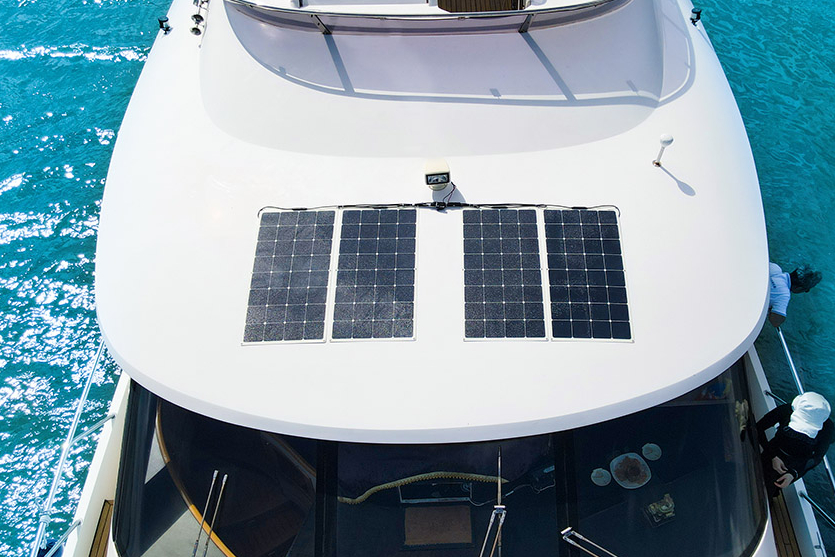Why are my flexible solar panels turning yellow?
This is something that users of flexible solar panels, whether in caravans, homes or marinas, are wondering about. Why is it yellowing when I haven’t put any yellow pigment on it nor have I smoked it with coloured fumes? In some cases, the yellowing is irreversible.
If you are looking for answers, then this article may be of help to you. This article will answer the question of why flexible solar panels turn yellow and provide you with a guide to maintaining your solar panels.
The composition and working principle of flexible solar panels
Before we can understand why solar panels are yellow, we need to understand the composition and working principle of flexible solar panels.
A flexible solar panel is a highly flexible and bendable solar device with some differences in composition and working principles from traditional rigid solar panels.
- Composition:
Solar cells: The core component of a flexible solar panel is the solar cell, usually a thin-film solar cell or a flexible silicon solar cell. These cells are made from thin film materials such as amorphous silicon, copper indium gallium selenide (CIGS) or organic materials, which have a high degree of flexibility and plasticity.
Surface materials: The surface of flexible solar panels are usually made of a flexible polymer material, such as polyester (PET) film. This material is transparent and flexible, protecting the solar cell and allowing light to pass through.
Conductive layer: Between the positive and negative electrodes of the solar cell, a conductive layer is usually coated, for example, a transparent conductive oxide (TCO) film such as tin oxide (ITO) or zinc oxide (ZnO). These conductive layers play a key role in current collection and electron transfer.
- Principle of operation:
Flexible solar panels work on a similar principle to conventional solar cells, using the photovoltaic effect to convert sunlight into electricity.
Light absorption: The surface material of a flexible solar panel is well transparent, allowing sunlight to pass through and reach the solar cell layer. Within the solar cell layer, photons interact with the film material, are absorbed and excite electrons.
Electron flow: The excited electrons generate an electrical charge in the solar cell and flow through the electron transport network of the conductive layer. An electrical potential difference is formed between the positive and negative electrodes, causing electrons to flow from the negative to the positive electrode, creating an electric current.
Electrical output: the current can be transmitted via wires to external circuits for driving electronic devices, rechargeable batteries or power supply networks.
Flexible solar panels work on a similar principle to rigid solar panels, but the use of flexible materials and thin-film cell technology allows them to adapt to curved and curved shapes, adding flexibility and versatility to their applications.
Causes of yellowing of flexible solar panels
There are many reasons for the yellowing of flexible solar panels, which need to be taken into account when determining:
EVA ageing: The epoxy-vinyl alcohol (EVA) used in solar panels is an adhesive material used to encapsulate and hold the cells in place. Over time, EVA may age and decompose, causing solar panels to yellow.
Glass surface contamination: The glass panels of solar panels are susceptible to coverage by contaminants such as dust, dirt and bird droppings. These contaminants can reduce the transmission of solar energy and cause yellowing under prolonged exposure.
Cell oxidation: The metal materials used in the cells, such as aluminium and copper, may be affected by oxidation, causing oxidation reactions on the surface of the cells, which in turn can cause yellowing of the solar panels.
Impact on efficiency
The yellowing of solar panels can affect their efficiency in generating electricity. Yellowing weakens the solar panel’s ability to absorb sunlight, thus reducing the efficiency of light energy conversion. The reduced light absorption capacity on the surface of the yellowed part of the cell results in less current being generated in that area, which in turn reduces the power generation capacity of the solar panel as a whole.
Studies have shown that for every 1% increase in the degree of yellowing of a solar panel, its power generation efficiency may decrease by approximately 0.5% to 1%. This means that solar panels with severe yellowing can lose considerable power generation capacity.
Maintenance Tips
The following solutions are available for the yellowing of solar panels:
Regular cleaning: Clean the surface of the solar panel regularly to remove dirt and contaminants to ensure that light can adequately pass through the glass panel.
Maintain the encapsulation layer: regularly inspect the encapsulation layer of the solar panel (usually EVA) and repair or replace it as necessary to prevent deterioration and decomposition.
Preventing oxidation: Use suitable anti-oxidation measures to protect the metal materials in the cells and reduce the occurrence of oxidation reactions.
Use high-quality materials: Choose a reliable solar panel manufacturer and ensure they use high-quality materials and manufacturing processes to improve the durability and resistance to the yellowing of solar panels. A good choice is a flexible solar panel such as Sungold, which uses UV-resistant materials to prevent efficiency loss due to the yellowing of the surface.
As solar technology continues to evolve, research into and improvement of the weathering and yellowing resistance of solar panels is an important direction. Future engineering and materials innovations may provide more durable, pollution-resistant and efficient solar panels. In addition, the development of smart cleaning systems and monitoring technologies that can detect the condition of solar panels in real-time and perform timely maintenance will help to improve the long-term performance and efficiency of solar panels. Continued investment in and support for solar energy research will help to promote the widespread use of renewable energy and reduce reliance on conventional energy sources.













